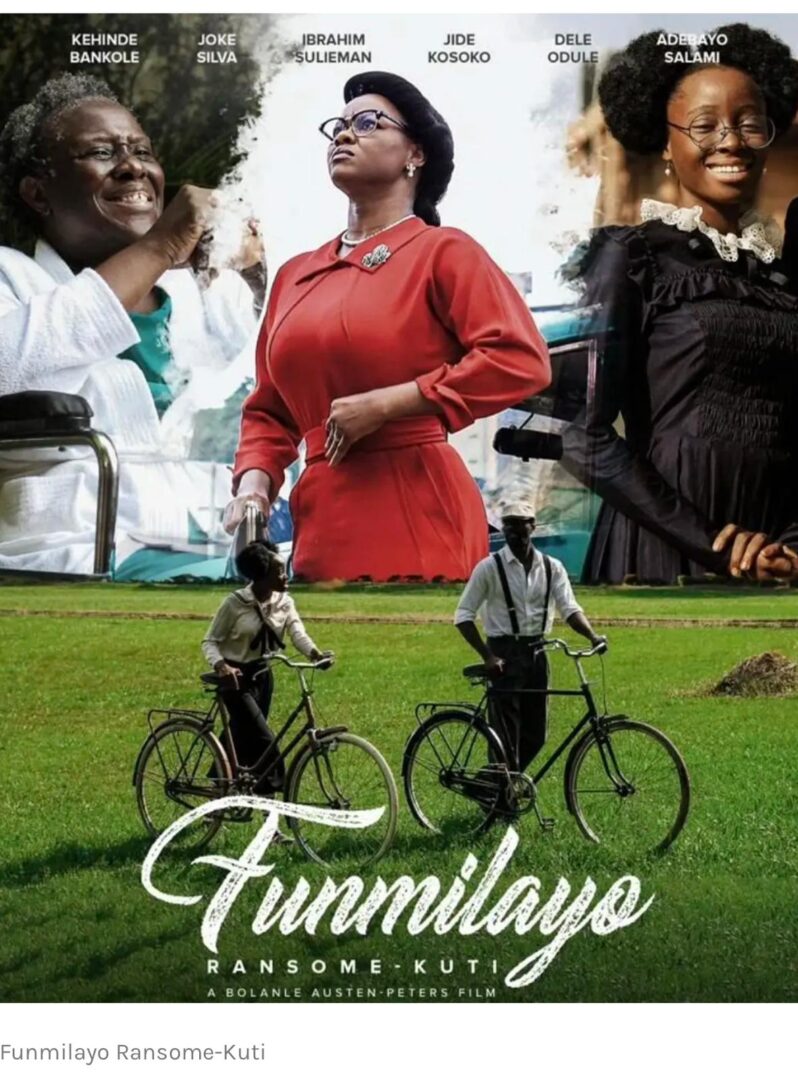 “OluFUNMILAYO RANSOME-KUTI” is a captivating biopic that delves into the life of one of Nigeria’s most prominent and influential figures. As a pioneering activist, educator, and political leader, Funmilayo Ransome-Kuti played a significant role in the country’s fight for independence and the advancement of women’s rights. The film, directed with meticulous attention to historical detail, presents a compelling narrative that both educates and inspires.
“OluFUNMILAYO RANSOME-KUTI” is a captivating biopic that delves into the life of one of Nigeria’s most prominent and influential figures. As a pioneering activist, educator, and political leader, Funmilayo Ransome-Kuti played a significant role in the country’s fight for independence and the advancement of women’s rights. The film, directed with meticulous attention to historical detail, presents a compelling narrative that both educates and inspires.
Storyline and Direction
The biopic chronicles the life of Funmilayo Ransome-Kuti from her early years in Abeokuta to her pivotal role in Nigeria’s socio-political landscape. The storyline is richly woven, capturing her fierce advocacy against colonial rule and her tireless efforts to uplift Nigerian women. The director skillfully balances the personal and political aspects of Ransome-Kuti’s life, portraying her as both a devoted mother and a formidable activist.
The film’s pacing is deliberate, allowing viewers to fully grasp the historical context of each event. The narrative structure employs flashbacks and archival footage, seamlessly integrating Ransome-Kuti’s personal anecdotes with major historical milestones. This approach provides a comprehensive view of her contributions while highlighting the personal sacrifices she made along the way.
Performances
The lead performance by Joke Silva as Funmilayo Ransome-Kuti is nothing short of mesmerizing. She embodies the character with a powerful presence, capturing the essence of Ransome-Kuti’s determination, intelligence, and compassion. The supporting cast, including as Israel Oludotun Ransome-Kuti, her husband, and as Fela Kuti, her son, deliver strong performances that add depth to the narrative.
The portrayal of the family dynamics is particularly noteworthy. The film explores the complexities of Ransome-Kuti’s relationships with her children, especially her famous son, Fela Kuti, providing a nuanced depiction of the balance between personal life and political activism.
 The film introduces Funmilayo Ransome-Kuti at three stages in her life: As a little girl (portrayed by Iyimide Ayo-Olumoko), a young woman (portrayed by Kehinde Bankole), and an older woman (portrayed by Joke Silva).
The film introduces Funmilayo Ransome-Kuti at three stages in her life: As a little girl (portrayed by Iyimide Ayo-Olumoko), a young woman (portrayed by Kehinde Bankole), and an older woman (portrayed by Joke Silva).
Cinematography and Production Design
The cinematography in “OluFUNMILAYO RANSOME-KUTI” is visually striking. The use of vibrant colors and authentic period settings immerses viewers in the 20th-century Nigerian landscape. The production design meticulously recreates the era, from the colonial architecture to the traditional attire, enhancing the historical authenticity of the film.
The director’s use of close-up shots effectively conveys the emotional intensity of pivotal moments, allowing viewers to connect deeply with Ransome-Kuti’s experiences. The cinematography also captures the large-scale protests and rallies, showcasing the collective power of the women’s movement she led.
Themes and Impact
“OluFUNMILAYO RANSOME-KUTI” explores several profound themes, including the fight against colonialism, gender equality, and the power of grassroots activism. The film illustrates how Ransome-Kuti mobilized women through the Abeokuta Women’s Union, challenging oppressive policies and demanding political representation.
The biopic also addresses the broader implications of Ransome-Kuti’s work, highlighting her influence on subsequent generations of activists. Her legacy is depicted as a catalyst for change, inspiring viewers to consider the ongoing struggles for equality and justice in contemporary society.
Critique
While the biopic is largely successful, there are moments where the pacing feels slow, particularly in the second act. Some scenes delve deeply into political meetings and negotiations, which, while historically significant, may not engage all viewers equally. Additionally, a more in-depth exploration of Ransome-Kuti’s interactions with other prominent figures of her time could have provided additional layers to the narrative.
“OluFUNMILAYO RANSOME-KUTI” is a powerful tribute to an extraordinary woman whose contributions to Nigeria’s history cannot be overstated. The film is an educational and emotional journey, offering a deep dive into the life of a trailblazer who paved the way for future generations. Through exceptional performances, meticulous direction, and a rich historical narrative, the biopic stands out as a significant cinematic achievement. It serves as both a reminder of past struggles and an inspiration for future advocacy, ensuring that Funmilayo Ransome-Kuti’s legacy continues to resonate.
Reviewd by : Jide Adesina

